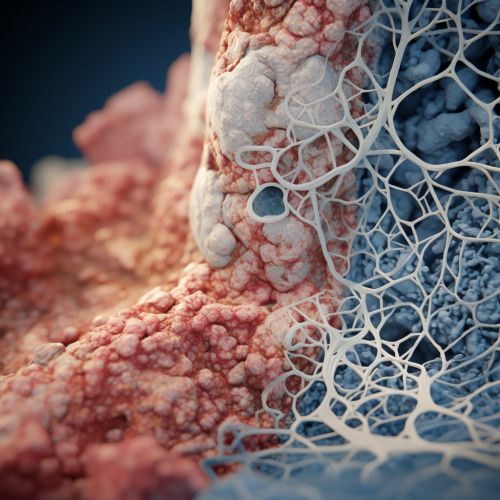Emphysema
Overview
Emphysema is a long-term, progressive disease of the lungs that primarily causes shortness of breath due to over-inflation of the alveoli. In people with emphysema, the lung tissue involved in exchange of gases (oxygen and carbon dioxide) is impaired or destroyed. Emphysema is included in a group of diseases called chronic obstructive pulmonary disease (COPD).


Causes
The primary cause of emphysema is long-term exposure to airborne irritants, including tobacco smoke, marijuana smoke, air pollution, and manufacturing fumes. This exposure can disrupt the repair and maintenance processes in the lung, leading to emphysema. In rare cases, the development of emphysema may be caused by deficiency of a protein called alpha-1 antitrypsin, which protects the elastic structures in the lung.
Pathophysiology
Emphysema involves gradual damage of lung tissue, specifically thinning and destruction of the alveoli or air sacs. This is due to the release of destructive enzymes from inflammatory cells that are activated in response to inhaled irritants. The loss of elastic recoil and collapse of the small airways lead to airflow obstruction and hyperinflation of the lung. This results in a decrease in the lung's ability to exchange oxygen and carbon dioxide, and the patient experiences shortness of breath.
Symptoms
The main symptom of emphysema is shortness of breath, which usually begins gradually. You may start avoiding activities that cause you to be short of breath, so the symptom doesn't become a problem until it starts interfering with daily tasks. Emphysema can also cause symptoms like fatigue, weight loss and a persistent cough.
Diagnosis
Emphysema is usually diagnosed based on the symptoms and a physical examination. During the physical examination, the doctor will listen to your lungs and check for certain signs, such as a barrel-shaped chest. Tests may include pulmonary function tests, chest X-rays, CT scans, arterial blood gas analysis, and laboratory tests to check for alpha-1 antitrypsin deficiency.
Treatment
While the lung damage caused by emphysema can't be reversed, it's possible to slow the progression of the disease and improve quality of life with treatment. Treatment options include quitting smoking, medications, pulmonary rehabilitation, oxygen therapy, and surgery. In severe cases, a lung transplant might be an option.
Prevention
The most effective measure to prevent emphysema is not to smoke and to avoid secondhand smoke. Also, wearing appropriate masks and protective gear when working with chemical fumes or dust can protect against emphysema.
Prognosis
The prognosis for emphysema depends on the stage of the disease at diagnosis, the patient's overall health, and whether the patient continues to smoke. With appropriate treatment and lifestyle changes, people with emphysema can improve their quality of life and slow the progression of the disease.
Epidemiology
Emphysema affects millions of people worldwide. It's more common in people who are middle-aged or older. The disease is more prevalent in men than in women, and in those who smoke than in non-smokers.
